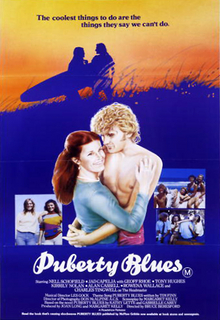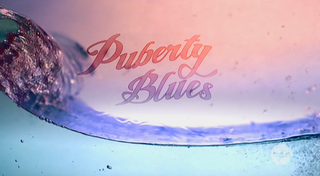Web most often refers to:
Brothers and Sisters may refer to:
Sweet Sixteen may refer to:
Wizard, the wizard, or wizards may refer to:
Departure, Departures or The Departure may refer to:
A crossfire is a military term for the siting of weapons so that their arcs of fire overlap.
Seesaw typically refers to a playground piece of equipment.
Haunted or The Haunted may refer to:

Puberty Blues is a 1981 Australian coming-of-age comedy-drama film directed by Bruce Beresford, based on the 1979 novel of the same name by Kathy Lette and Gabrielle Carey.
Gabrielle Carey was an Australian writer who co-wrote the teen novel, Puberty Blues with Kathy Lette. This novel was the first teenage novel published in Australia that was written by teenagers. Carey became a senior lecturer in the Creative Writing program at the University of Technology Sydney, studying James Joyce and Randolph Stow.
Crossroads, crossroad, cross road(s) or similar may refer to:
High Life, The High Life, or Highlife may refer to:

Charlotte Elise Best is an Australian actress and model. She is best known for her role in the show Home and Away as the young girl in the Campbell family, Annie Campbell.

Puberty Blues is an Australian coming-of-age comedy-drama television series broadcast on Network Ten. It is based on the 1979 book by Kathy Lette and Gabrielle Carey, which was also the inspiration for the 1981 film Puberty Blues. Set during the late 1970s, the series revolves around the family and friends of Debbie and Sue, two inseparable teenage friends who are coming of age in Sydney's Sutherland Shire. The first series of eight episodes began airing from 15 August 2012. A second series was later confirmed and premiered on 5 March 2014.

Ashleigh Cummings is an Australian actress. She became known for her role as Robyn Mathers in Tomorrow, When the War Began. The film, based on the book of the same name, earned Cummings a nomination for Best Young Actor at the 2010 Australian Film Institute Awards. Cummings is also known for her roles as Dorothy Williams in ABC1's Miss Fisher's Murder Mysteries, as Debbie Vickers in Puberty Blues, as Vic McQueen in NOS4A2, and as Abby Conroy in the spy action thriller series Citadel.
Childhood is the age span ranging between birth and puberty.

Puberty Blues (1979) is a novel by the Australian writers Gabrielle Carey and Kathy Lette. It is their first published book. It has long been controversial with adults but much sought out by teenagers for its depictions of adolescent sex. A film based on the novel was released in 1981. A television series based on the novel began airing in 2012.
Jad Capelja was an Australian actress best known for her role in the 1981 teen film Puberty Blues, based on the novel of the same name.
This page is based on this
Wikipedia article Text is available under the
CC BY-SA 4.0 license; additional terms may apply.
Images, videos and audio are available under their respective licenses.




